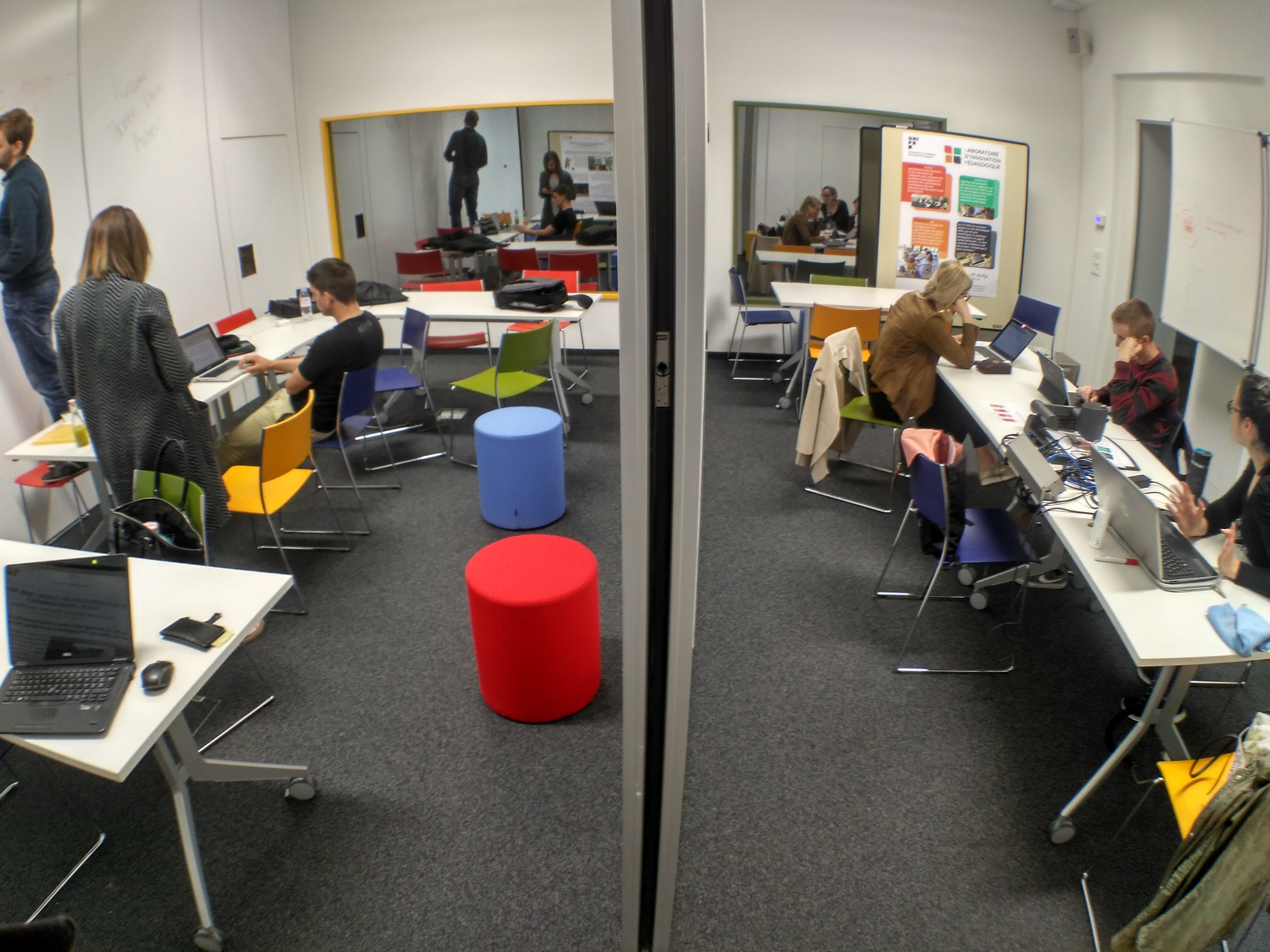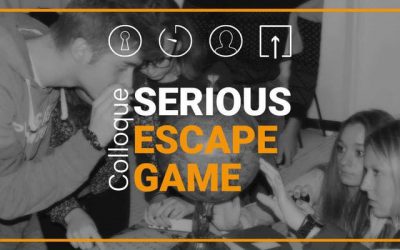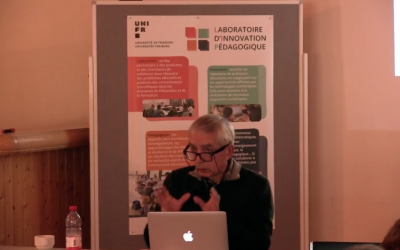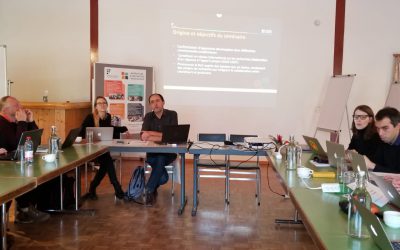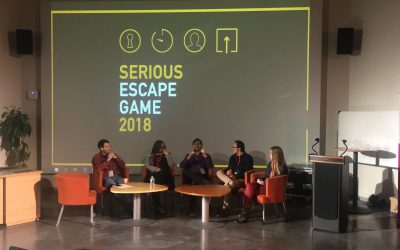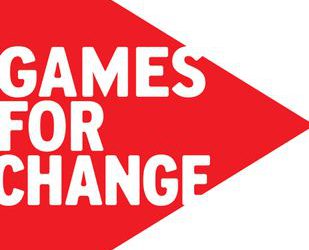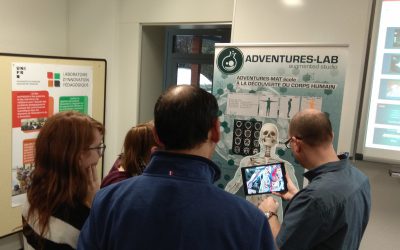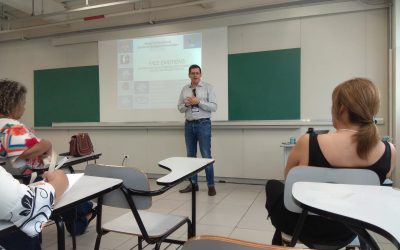co.LAB – A Digital Lab for the co-Design, co-Development and co-Evaluation of Digital Learning Games
Interest in Digital Learning Games (DLGs) has flourished at all levels of education. Digital Learning Games contribute to increasing students’ motivation and engagement, and are effective tools to support learner centered teaching practices. However, the design, development and uses of DLGs remain an issue due to the gap between teachers, game developers and researchers.
At the crossroads between educational and computer sciences the goal of the co.LAB project is to improve the design, development and uses of Digital Learning Games at all educational levels in Switzerland. This goal will be achieved by the development of what we call the co.LAB: a collaborative methodological framework between teachers, game developers and researchers in educational science, associated with a collaborative digital platform dedicated to co-design, co-development and co-evaluation of DLGs.
With the development, implementation and assessment of the co.LAB methodology and digital platform, we want to answer the following research questions (RQ).
RQ1: What methodology is needed to support collaborative DLG design and development?
RQ 2: What are the digital platform features necessary to support the collaborative DLG design and development process?
RQ 3: What are the effects of the methodology and digital platform on development cost and duration (efficiency)?
RQ 4: What are the effects of the methodology and digital platform on the quality of DLGs produced (relevance and effectiveness)?
RQ 5: What are the drivers for adoption of the methodology and digital platform by the educational, game developer, and research communities?
Following a design-based and mixed methodology, the co.LAB methodology and digital platform will be implemented and tested with the design, development and evaluation in real educational contexts of two showcase games dedicated to medical education (higher education) and computational thinking (secondary education). They will be used as a proof of concept. The experimentations will be carried out with classes both in a secondary school and at a university of applied sciences. The data collected will be based on an ethnographic approach on the one hand (questionnaires and focus groups carried out with stakeholders), and on the digital traces of users of the platform on the other hand.
By including a digital infrastructure for digital learning resources development and by providing, as a use test result, two digital learning games the project is fully in line with the PNR77 goals and more specifically with the module “Education, learning and digital change”. In addition, the co.LAB methodology, digital infrastructure and laboratory may serve both as an example of the introduction of digital in education and as a basis for future co-development of open digital educational resources in general.
Durée du projet
01/2020 – 12/2023
Financement
Fonds National Suisse

Requérants principaux
Dominique Jaccard HEIG-VD et Eric Sanchez, Université de Fribourg
Partenariat
Haute Ecole d’Ingénierie et de Gestion du Canton de Vaud
Membres du projet
Estelle Prior Unige
Mariem Jaouadi Unige
Membres associés
Nadine Mandran LIG/U. Grenoble
Matthieu Vermeulen IMT Nord Europe
Emmanuel Beffara U. Grenoble
Gaëlle Guigon IMT Nord Europe
Jérémie Humeau IMT Nord Europe
Anthony Fleury IMT Nord Europe
Contact
Eric Sanchez (eric.sanchez@unifr.ch)
Dernières actualités relatives à cette recherche
Serious Escape Game – Lille – Jour 2
Colloque Serious Escape Game - Lille - Jour 2 #SEG2018 Cette seconde journée au Colloque SEG 2018 à Lille débute par une conférence de Gilles Brougère (Paris13), invité d'honneur de l'événement, sur le jeu et l'éducation en tant que production...
Séminaire RoC 2018 – jour 1 (bis)
Nous publions dans ce billet l'enregistrement de la conférence introductive de Gérard Sensevy donnée dans le cadre du séminaire sur les recherches collaboratives. La conférence permet de poser des jalons théoriques et épistémologiques pour penser la question des...
Séminaire RoC 2018 – jour 1
Le séminaire RoC2018 qui se tient du 17 au 20 décembre 2018 à Château d’Oex en Suisse réunit 21chercheurs venus du Québec, de France et de Suisse pour travailler sur les recherches collaboratives dans le champ de l’éducation et de la formation. La conférence...
Serious Escape Game Lille – Jour 1
Colloque Serious Escape Game - Lille - Jour 1 #SEG2018 l'ESPE Lille-Nord-de-France, IMT Lille-Douai et le CRI, en partenariat avec la Serre Numérique, la DANE de Lille, Canopé Lille, l'Université Polytechnique des Hauts-de-France co-organisent un colloque...
Retour sur le séminaire G4C Europe
Le LIP a été invité à contribuer à l’événement Game for Change Europe qui s’est tenu à Paris les 19 et 20 novembre 2018. Cet événement a pour but de faire se rencontrer des concepteurs de jeux et des acteurs qui s’intéressent à l’enseignement et l’apprentissage....
Conférence GALA (SGS) à Palerme (Italie) – jour 3 (07.12.18)
Troisième et dernière journée de la conférence. Elle débute avec une conférence de Georgios N. Yannakakis qui porte sur les liens entre l’intelligence artificielle (IA) et les jeux. L’IA est aujourd’hui utilisée pour modéliser le joueur et effectuer des prédictions ou...
Conférence GALA (SGS) à Palerme (Italie) – jour 2 (06.12.18)
Cette seconde journée de la conférence GALA 2018 a permis de constater que la question du débriefing avait un statut variable selon les dispositifs expérimentés. Pour certains dispositifs, aucun débriefing n’est mis en place ou c’est le dispositif de recherche qui en...
Conférence GALA (SGS) à Palerme (Italie) – jour 1 (05.12.18)
Le LIP s’est déplacé à Palerme pour participer à la conférence Game and Learning Alliance (GALA). Nous débutons aujourd’hui une chronique quotidienne de cette conférence. Dans sa conférence introductive intitulée Designing Engaging Educational Games: Affective,...
Enseigner les sciences avec la réalité augmentée : partenariat avec Adventures-Lab
Ce mardi 27 novembre, nous recevions au Laboratoire d’innovation pédagogique de l’Université de Fribourg, Thomas Crausaz, CEO et fondateur d’Adventures-Lab, une Ed-Tech spécialisée en réalité augmentée. Cette entreprise propose un dispositif pour les écoles sous la...
Congresso brasileiro psicologia: ciência e profissão
Sur le chemin du retour d’Uberlandia où nous avons pu procéder au recueil final des données pour le projet Classroom Management Ludicized, le LIP a fait un stop à Sao Paulo pour présenter les résultats du projet lors du congrès brésilien de psychologie. C’est Celso...

